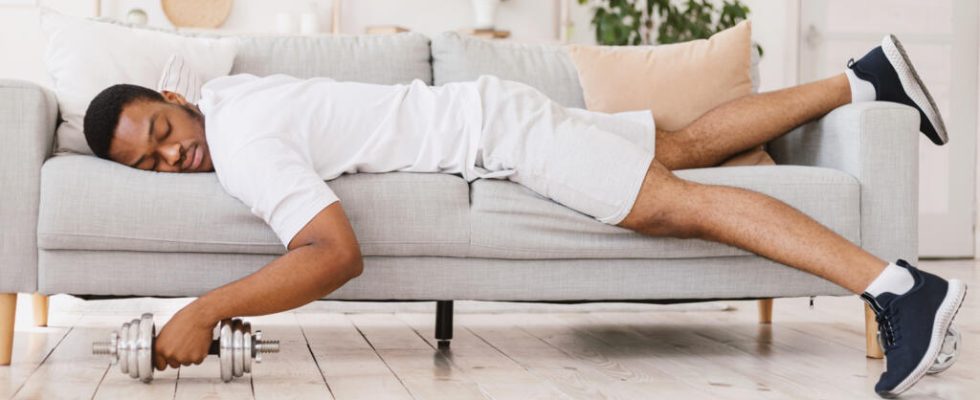Every week, Dr. Jean-Marc Sène, sports doctor, presents his sports column in Priorité Santé. Today we are talking about sleep! It is an activity that is not necessarily linked to sport and yet they have many reciprocal influences.
First, do you need more sleep when you’re athletic?
No, playing sports does not require you to sleep more. There is no need for increased recovery. Similarly, sleeping more does not make you perform better in sport. There is therefore no established relationship between sleep duration and sports performance.
On the other hand, we know that sports practice has the effect of accentuating the depth of sleep. That is to say, it acts above all on the time spent in deep slow-wave sleep, which is more effective for recovery!
A cycle consists of:
- of one slow wave sleep phasewhere you wake up easily
- a slow-wave deep sleep phasewhere waking up is more difficult, because the brain becomes more and more insensitive to external stimuli (noise, light)
- a REM sleep phase, when we dream the most. This name comes from the paradox between the signs of deep sleep (the body is completely relaxed) and intense brain activity.
But this effect exists especially if the sportsman has a moderately intensive physical activity, of the endurance type such as running, cycling, swimming, elliptical trainer, running on the treadmill, etc., even for a long time. (greater than 45 minutes).
Can exercise disrupt sleep?
It would seem that ball games, dynamic muscle strengthening, and all exercises that require attention, a competitive spirit and/or tactics more or less strongly delay falling asleep. More generally, these are stimulating sports that increase the level of alertness.
On the other hand, it seems that a sport practiced regularly (that is to say, integrated into lifestyle habits) at the end of the day does not disturb sleep. If it was classically accepted that sport practiced in the evening interferes with falling asleep – in particular because of the increase in body temperature – some more recent studies have shown, on the contrary, that physical activity promotes falling asleep, provided that it is stopped at least four hours before bedtime.
There is therefore no consensus today on this point, be pragmatic and listen to your body’s signals!
Is sleep so important for recovery? How do we know if we have slept enough?
The programming of recovery and more particularly of sleep in a training program is therefore essential, whether you are a high-level athlete or whether you are getting back into regular physical activity for that matter.
Disturbed sleep quality – i.e. reduced sleep efficiency, frequent awakenings, but also a deterioration in mood and performance, with additional stress – are the first signs of sports overwork when the practice is intensive. Sleep is essential!
One of the first criteria of the quality of our sleep is the feeling of fatigue on waking and during the day. If we wake up in good shape, it is very likely that our sleep will be good. If you want to sleep during the day, or you yawn easily, it is likely that the sleep quality is poor. And if sleep is of poor quality, it is sometimes disturbed by certain pathologies such as:
- sleep apnea syndrome
- restless leg syndrome
- anxiety and depression
Some tips for sleeping well?
Five precautions to preserve your sleep when you are active:
- Allow an interval of 2 to 3 hours between intense physical activity and bedtime. If it is too close to bedtime, it can, for some people, delay falling asleep.
- To help lower your body temperature, you can take a cool shower after sports. A few rare studies also advise the hot bath whose benefits would be due to the “rebound effect” (after increasing body temperature, lowering it is facilitated by this rebound effect).
- Limit sensory stimulation as much as possible : light sources that cause micro-awakenings, noises in the bedroom, the temperature of the room (18°C ideally), take care of your bedding.
- A siesta, when it’s possible. The ideal is a long nap of 90 minutes following an intense sporting effort, but that does not mean deep sleep for 90 minutes! It is rather a period of calm and relaxation… A nap of 15-20 minutes is already restorative. The interest of the siesta is well demonstrated, especially when the training load increases.
- Everything is in order, weekends included! There is an internal clock (hypothalamus) that regulates this sleep/wake rhythm: the more regular we are, the more our clock is synchronized, the more effective the recovery will be, notably through the secretion of hormones which are involved in this phenomenon (one thinks in particular of growth hormone). Shifting one’s schedule for falling asleep and waking up at the end of the week promotes a desynchronization of the sleep/wake rhythm. And we will take several days to find our rhythm. Rather than sleeping in, it is better to take a nap!
